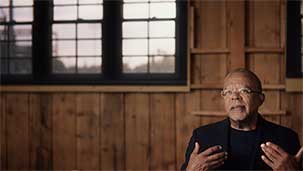13TH begins with a shocking statistic: while the United States accounts for only 4-percent of the earth’s population, incarcerated Americans make up 25-percent of its total prison population. Activist and commentator Van Jones describes it thusly: “One out of four human beings with their hands on bars, shackled, are locked up here in the land of the free.”
This documentary, directed by your older sister Ava, makes its case early: that the Thirteenth Amendment to the United States Constitution, which on its face abolished slavery and is considered one of the great progressive accomplishments of modern history, has in fact done the opposite: enabled a second century of slavery.
The proof you and your sister lay out in the first act of the film is so compelling, so seemingly irrefutable, that the film almost seems to make itself redundant before it’s even half finished. But the abundance of empirical data is only one part of your assertion. An audience can’t really feel a number, even if it’s a number as devastating as the steadily climbing tally of America’s prison population over the latter half of the 20th Century. And this is where your research, particularly into television and news archives, is essential.
This film is defined by powerful montages of images that occur parallel to its thesis; these sequences function less as intellectual arguments than they do as a provocation to the rational, good-hearted people who might watch a film like this and feel at a moral distance from all that historical fact. And none of those montages is more powerful than the one that features clips of recent Donald Trump rallies in which black protestors are heckled, spit upon, and punched, interspersed with footage – much of it seen earlier in the film – of black citizens in the 1950s being heckled, spit upon, and punched in the streets of small town America as they exercise their basic human right to exist. All of this is set to audio of the President-Elect himself ruminating wistfully about “the good old days” and how law enforcement used to “know how to take care of” civil disobedience (“if you know what I mean”).
When it gets into the bureaucratic details of how government and big business have conspired to corporatize the prison system, the vigour of the film begins to wane. But I’m not sure if this is a failing of your movie or a failing of human rectitude. We are easily moved to action by images and music and personal pleas and even digestible statistics like the ones that are cleverly dispersed throughout the film, but, when faced with the mundane practicalities of how these horrors have become embedded so deeply within the our sociopolitical systems, our attention abates. It’s hard to see evil when it’s so goddamned beige. I suppose this is why businesspeople run the world and artists merely observe it; they have an appetite for banality that we beauty-seekers simply can’t match.
The roster of people assembled to provide commentary is broad and diverse and includes everyone from Bryan Stevenson to Newt Gingrich (looking smug, but making a couple of reasoned observations that seem at odds with the utter distaste for common decency he has displayed as the current president’s Grima Wormtongue). Angela Davis makes an appearance, and the clip from an old television interview in which she recalls the threat of violence sustained throughout her childhood in Alabama is a profoundly humanizing moment for a political figure who is better known for her hairdo than her heroic dissent (here’s a shocking statistic I’ll offer you in return: a Google search for “Angela Davis activist” returns half a million results; a search for “Angela Davis hair” returns nine million.)
13TH ends as it begins: with numbers. 1 in 3 black men are likely to spend time in prison at some point in their lives (compared to a 1 in 17 chance for the average white male). This is a common stat, but as a summation of everything that comes before it in this film, it’s excoriating. One can’t help but wonder, in this frightening political climate: is that number going to change? And if it does, will it change for the worse?
Sincerely,

Jared






